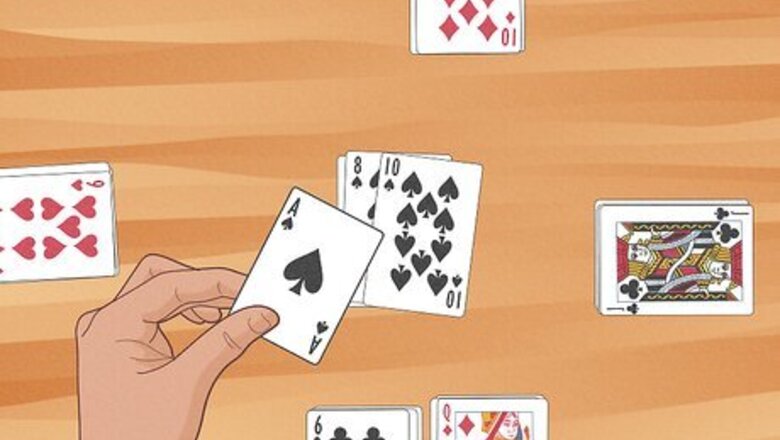
views
Bridge

Work as a team to take more tricks, or hands, than your opponents. Bridge is an old game of bidding and trick-taking. Teammates sit across from each other and deal a 52-card deck. Then players take turns betting on whether or not they have the most valuable cards. The highest bidder chooses the trump suit, or most valuable suit, and the defending team leads each trick in the round. The team that takes 7 or more tricks out of 13 wins the round. Points are awarded based on how many tricks are taken, as well as for fulfilling “contracts,” or highest bids. Teammates have limited communication, primarily signaling to each other through their bids, making this a tense game that tests your chemistry with your teammate. Bridge can be a little daunting at first, but once you get the hang of the rhythm of the game, it breaks wide open, into a high skill ceiling. There’s always new strategies to try!
Whist
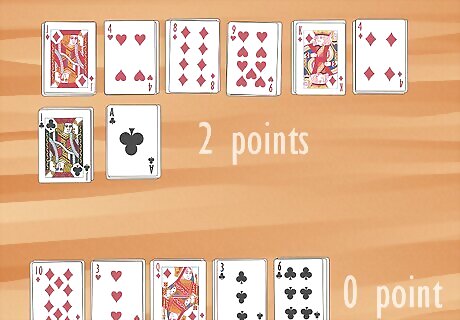
Play a simpler game of Bridge while bidding and taking tricks. Whist is another oldie, and has mostly been replaced by Bridge, but remains classic. Teams of 2 sit opposite each other, and each player is dealt 13 cards. The last card is the dealer’s, and is placed face-up, determining the trump suit. The player to the dealer’s left leads with any card, and other players must follow suit, or play any card if they don’t have a card of that suit. The highest value card, or trump card, wins the trick. After 13 tricks, the team who won the most tricks scores 1 point for each trick over 6 that they won, and the team who’s first to 5 points wins.
Palace

Race to use up all the cards in your “palace” before other players. Palace is a showy game where discarding is key. Each player is dealt 3 face-down cards, then 6 face-up cards. They choose 3 of these 6 to keep, and the other 3 become their hand. Players then take turns discarding as many cards as they can, but may only discard cards of the same or higher value than the last card discarded. If a player can’t discard, they take the entire discard pile. Once a player plays all the cards in their hand, they move on to their “palace,” or the cards in front of them on the table. They play their face-up cards first, then make risky plays with their face-down cards. The first player to play all the cards in their palace wins the game. In Palace, 2s are wild, and 10s are “bombs” that clear the discard pile.
Rummy

Race to see who can discard every card in their hand. Rummy is another old game, with loads of variations. A 52-card deck is dealt among the players, 7 cards to each. Players take turns drawing a card from the deck or discard pile, laying down melds of 3-card runs or sets of 3-4 cards of the same rank, laying off cards onto other player’s melds, and finally discarding a card. Play continues until 1 player has no more cards in their hand, and the score is tallied. Players gain points for each card remaining in their hand. Face cards are 10, Aces are 1, and number cards are face value. The aim is to have as few points as possible by the time a predetermined score threshold is reached.
Gin Rummy
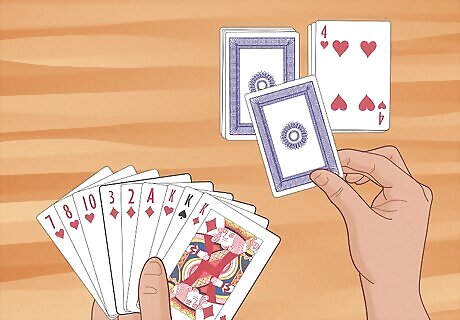
Keep your hand a secret in a higher-stakes game of Rummy. Gin Rummy is an offshoot of Rummy, but here players must draw and discard to build melds of runs and sets within their hands, rather than laying them on the table, and aim for the highest score. Any card not in a meld is “deadwood,” and once a player has 10 or fewer points in their deadwood, they may knock to signal the close of the round. After, the knocker lays out their melds, and other players attempt to lay their own deadwood into these melds. Or, the knocker can “go gin” by melding all their cards, automatically scoring a bonus. If the knocker still has fewer points in their deadwood after other players have laid off, the knocker scores the difference. If the other players have fewer points in their deadwood after laying off, they score a bonus, plus the difference.
Euchre
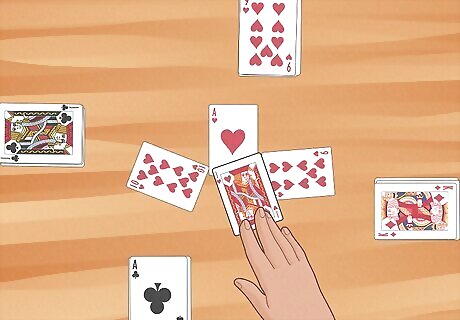
Take tricks with a teammate using only a partial deck. Euchre is played with only the 9 through Ace cards of each suit, and teams aim to be the first to 10 points. Five cards are dealt to each player, and the top card of the remaining deck sets the trump suit, which players must agree on. The player to the left of the dealer plays a card to lead the trick, and the other players follow suit, trying to play the most valuable card to win the trick. Players continue playing and taking tricks until they have no cards in their hands, whereupon they tally the score. Teams earn points for taking the majority of the tricks, and bonus points for taking all 5 tricks. Interestingly, players can opt to “go alone” on a round if they think they can win each trick without their partner, potentially scoring bonus points. Another wily snag is that the Jack of the trump suit, and the suit of the same color, becomes the highest-valued cards each round.
Spades
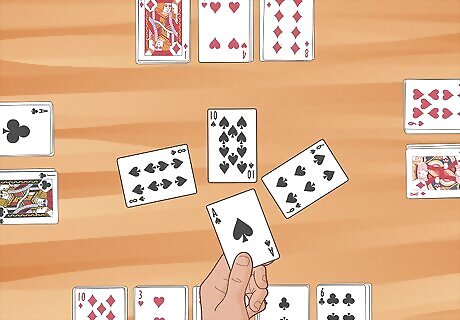
Team up with another player in a simplified trick-taking game. Spades is one of the easier trick games. Players are each dealt 13 cards, then bid on how many tricks they think their team will take. The player to the left of the dealer plays first. Players cannot play, or “break,” spades unless they only have spades in their hand, after which anyone can play a spade. The player who plays the highest card of the leading suit (or the highest spade, if spades were “broken”) wins the trick. The round continues for 13 tricks, until everyone is out of cards, and the score is tallied. Teams only score if they meet their bid. Teams aim to have the highest score at the end of a predetermined number of rounds. Teams can bid 0 to bet that they’ll take 0 tricks. If they succeed, they score bonus points at the end of the round.
Hearts

Discard cards of the same suit to score as few points as possible. Hearts is an even simpler trick-taking game. Players play alone, and are each dealt 13 cards. The player with the 2 of clubs plays it first, if possible, and each player must then play clubs, if possible, or any other suit but hearts, if not. The highest card of the leading suit “wins” the trick, and the player takes the played cards. Players continue playing tricks until no cards are left in their hands. Players cannot play hearts until hearts have been “broken,” meaning 1 player has no choice but to play a heart. After 13 tricks, the score is tallied. Each heart a player has taken as part of a trick is worth 1 point, and the Queen of Spades is worth 13. Typically, the game repeats until 1 player reaches 100 points. Players can “shoot the moon” by taking every heart in the deck as well as the Queen of Spades, scoring 0 and forcing every opponent to gain 26 points.
Crazy Eights
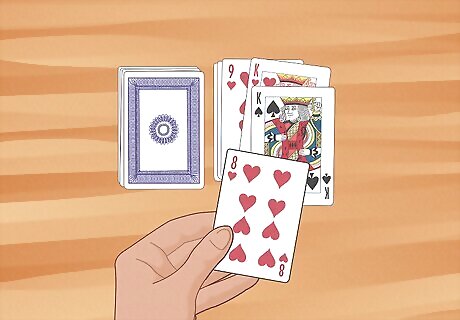
Race to play all your cards in this match-making card game. Crazy Eights is a simple game of discarding that anyone can learn. Shuffle and deal 6 cards out of a 52-card deck to each player. The player to the left of the dealer goes first, playing any card they like. Other players must then play a card that matches either the suit or the number of the last card played, or draw from the deck until you get a playable card. The first player to run out of cards wins. Eights are wild, and can be played over any card. If you play an 8, you may name a suit that the next player must play.
Canasta

Score big points by melding “canastas,” or sets of 7 cards. Canasta is another Rummy variant. Players split into teams of 2 and are dealt 13 cards each. Players take turns drawing, melding sets of cards of the same value or adding cards to melds, and discarding, until 1 player has no more cards in their hand, and points are tallied. A team's score is the value of every card they melded onto the table, minus the values of the cards left in their hands. The first team to 5,000 points wins. Melds of 7 or more cards are called “canastas,” and are eligible for hundreds of bonus points based on whether or not they contain certain cards, like black or red 3s.




















Comments
0 comment